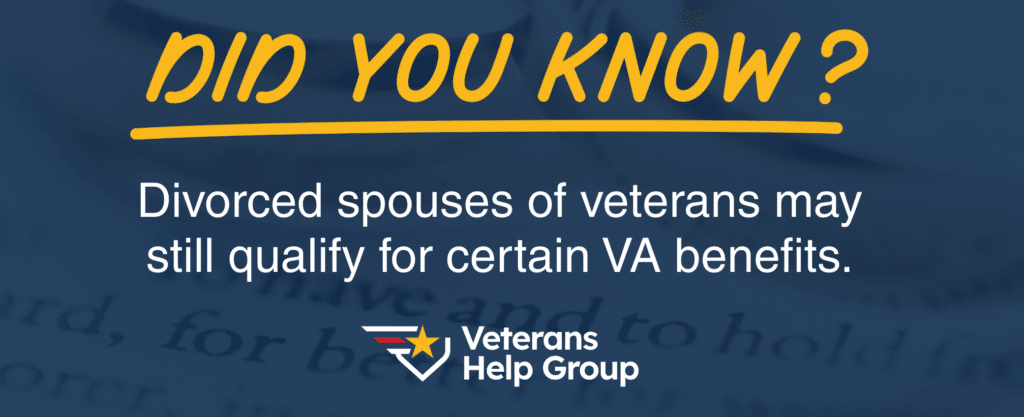Divorced Spouses and Military Benefits
If you’re a retired service member, a veteran receiving VA disability or other veterans’ benefits, or the spouse of either, divorce can impact your benefits. How divorce affects your benefits depends on a variety of factors, including whether you are the veteran or the spouse and the type of benefits you are receiving. In some cases, other factors such as the veteran’s VA disability rating and the length of the marriage can also have an impact.
The best way to get complete, reliable information about how divorce may affect your benefits is to talk to an experienced veterans benefits advocate. This page offers a high-level overview of how different types of benefits are treated when a couple divorces.
Table of Contents
Divorce May Change the Amount of Benefits Received
A veteran receiving VA disability benefits may see a decrease in their monthly compensation after divorce. That’s because disabled veterans with a 30% disability rating or higher can get additional benefits for eligible dependents, including spouses and stepchildren. After divorce, neither will be considered a dependent. So, that additional compensation will stop.
When that happens, it’s up to the veteran to remove those dependents. You’ll want to do that as soon as possible, because any amount overpaid because dependents were not removed can be deducted from future benefits.

VA Benefits for Former Spouses of Veterans
The divorced spouse of a veteran may, in certain circumstances, still qualify for some benefits. However, there are strict restrictions. For example, the divorced spouse of a veteran entitled to military retired pay may receive 50% of the retirement benefit, along with access to TRICARE services and commissary privileges. But, the former spouse is eligible for these benefits only if:
- The veteran has at least 20 years of military service, and
- The marriage lasted at least 20 years, and
- The marriage and military service overlapped by at least 20 years, and
- The former spouse is unmarried
The best way to get full information about the benefits that may be available to you as the divorced spouse of a veteran is to consult an experienced veterans benefits advocate.
Division of Military and Veterans Benefits in Divorce Court
There’s a lot of confusion about how military retirement and VA disability benefits are treated in divorce proceedings. In part, that’s because these two types of benefits are treated differently. In part, it’s because there are some exceptions to federal protections for veterans benefits.
Military Retired Pay is a Marital Asset
Just like most other types of retirement benefits, military retired pay is a marital asset and is subject to division by the divorce court. The spouse may be awarded up to 50% of the veteran’s retirement benefits. However, there are some complications that veterans and their soon-to-be-former spouses need to understand. First, federal law sets forth specific jurisdictional requirements for dividing military retirement benefits in a divorce case. So, a divorce court may have jurisdiction over a divorce case under state law but still not have the power to divide military retirement benefits unless the service member or former service member consents.
The way the award is entered also impacts how future benefits are calculated. If the former spouse is awarded a specific amount, that amount remains constant. However, if the former spouse is awarded a percentage, their benefits will be increased when cost-of-living adjustments are applied.
VA Disability Pay is Not a Marital Asset
VA disability pay is, by federal statute, not a marital asset and not subject to division by the divorce court. But, this issue is a bit more complicated than it sounds. For example, though the divorce court can’t divide VA benefits, courts in many states will consider VA disability benefits as income when determining the amount of child support or spousal support a veteran is ordered to pay. As a practical matter, that means the veteran may have to use VA disability benefits to pay those obligations.
If the veteran fails to pay, they can be held in contempt of court. But, the divorce court can’t necessarily garnish those benefits to cover the support obligation like they could a paycheck or some other types of income. VA disability pay is subject to garnishment only if the veteran waived military retired pay to receive VA disability benefits, and only to the extent that the benefits are in lieu of retirement pay.
However, federal law does provide another option when a disabled veteran fails or refuses to pay child support. In some circumstances, the benefits may be apportioned–divided between the veteran and the dependent or dependents–when they are issued.
Get Help Understanding Military and VA Disability Benefits During and After Divorce
If this all seems complicated, that’s because it is–and this overview includes only a few examples of possible scenarios. If you are a veteran who is divorcing while receiving military retirement pay or VA disability benefits, or you are the spouse of a veteran and considering divorce, it’s important that you have complete and accurate information about how benefits will be affected.
At Veterans Help Group, we are committed to helping veterans and their families secure the benefits they deserve, whether that means explaining your rights, assisting in putting together the strongest possible VA disability claim, appealing a denial or too-low disability rating. To learn more about how we can help, call 855-855-8992 right now, or fill out our contact form.






